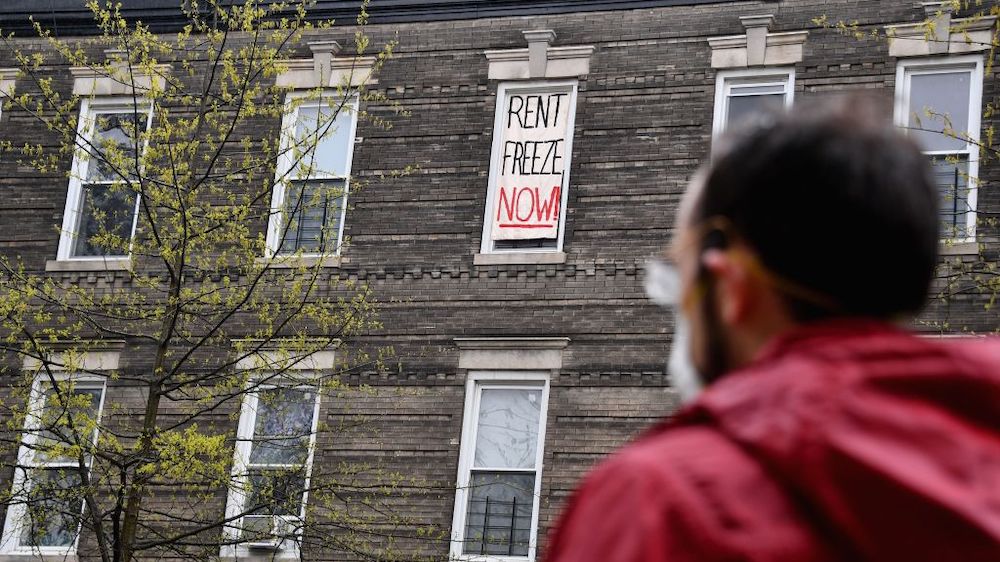
Angela Weiss / AFP via Getty Images
More households paid their rent in the first week of May than were expected, a sign that expanded unemployment benefits and stimulus payments are helping some people make their bills.
By this past Wednesday, 80.2% of U.S. renters had paid all or part of their May rent, according to figures released Friday by the National Multifamily Housing Council, a landlord trade group. That is up from 78% of renters who paid their rent by April 6, according to the group’s analysis of payments across 11.5 million market-rate apartments.
Still, the proportion of people paying was down versus the May period last year, when 81.7% paid on time. The paid-rent numbers include partial payments, as more landlords are offering payment plans to tenants who fall behind on rent.
“We are in uncharted waters,” said Doug Bibby, the president of NMHC, “and will be watching this closely over the course of the month as millions of households will not be able to access unemployment benefits, and those who have may find that they are not enough to cover rent plus all the other financial pressures caused by this crisis.”
Real Property Management Group Inc., in Atlanta, which manages about 330 rental homes and collects average monthly rent payments of $1,150 to $1,200, received about 70% of its total monthly rent by May 7, said co-owner Charlie Chico. The company in a typical month would collect 85% of its rent by that point, he said.
“We’re looking at tenants that have been with us long-term, that have always paid well, and we’re giving them a lot of room,“ Mr. Chico said. ”We’re letting them come up with options.”
Not all apartment renters report receiving flexibility on their unpaid rent, however. Activist groups in New York, California and elsewhere say they will press ahead with rent strikes this month in the wake of the steep rise in unemployment.
Westriketogether.org, a website compiling the efforts of activist groups including the Alliance of Californians for Community Empowerment and Housing Justice for All, in New York, claims nearly 200,000 people across the U.S. have signed petitions committing to not pay rent until the government takes action on rent.
The strikers’ target isn’t so much landlords as it is government intervention in the housing market to “cancel” rent and home-mortgage payments—without requiring residents to pay them back—for the duration of the coronavirus pandemic.
Rent-strike efforts so far have relied on existing networks of tenant activists, such as at the Cosmopolitan Houses in Queens, N.Y., where organizers said last month the majority of people in 17 buildings committed to not pay rent, mostly due to inability to pay, they said.
But these are just opening salvos in what organizers say will be a continued push through the rest of the spring. New recruits and more strike activity are expected to target large corporate landlords, who activists believe should absorb a heavier financial hit from the coronavirus than tenants.
In Kansas City, Mo., 28-year-old Jake Mobley decided to quit his job as an apartment leasing agent in March because he could no longer reconcile working in real estate with his burgeoning left-wing political beliefs, he said.
The employer Mr. Mobley left was his very own landlord, against whom he is now striking along with tenants he organized from five of his apartment complex’s 10 occupied units. His neighbors include unemployed cooks and janitors. “I can’t justify in my mind why it’s right that they should lose their income, but the landlords get their paycheck, no matter what,” he said.
Many states have enacted temporary moratoria on evictions, meaning tenants who don’t pay rent can’t be immediately forced out, though they could be evicted after the moratoria end.
Some small landlords say they have little recourse if tenants don’t pay. Heather DeAngeli of Reno, Nev., reduced the monthly rent for a house she owns from $1,590 to $1,200 for May, after her three tenants said they couldn’t afford the full amount. Two of the tenants paid the lowered rate, but one moved out in late April without paying, Ms. DeAngeli said.
“There’s nothing we can do,” she said.
While labor strikes often target industries dominated by large publicly traded companies, the real-estate industry is much more decentralized, with less-standardized practices and assets that are more likely to be privately held. That makes it difficult for concessions made by a landlord in one city to translate into broader change, said Cea Weaver, a New York tenant activist and campaign coordinator for Housing Justice for All, a coalition of over 70 tenant and homeless advocacy groups in New York state.
“If McDonald’s raises its minimum wage to $15 an hour, that puts pressure on Wendy’s and Burger King to follow suit,” she said. But in the strike movement, she said, “I don’t know how we build that sort of shared assessment of what is normal industry behavior.”
Government responses to unpaid rent have fallen short of what activists like Ms. Weaver envision. New York Gov. Andrew Cuomo has extended temporary prohibitions on tenant evictions until Aug. 20 and said the state would allow tenants to use their security deposits to help cover unpaid rent. As for rent payment issues that remain after August 20, Gov. Cuomo said: “Whatever happens, we will handle it at the time.”
Many landlords, meanwhile, have been directing tenants to unemployment benefits and other programs that can help them make rent payments. More than 30 million people have filed for unemployment since March. There are signs that the funds aren’t getting to everyone quickly, as state unemployment offices report bugs and delays.
As for landlords struggling with a lack of rent coming in, the federal government has allowed landlords with government-backed mortgages to defer their mortgage payments, but this covers less than one-third of the total rental market, according to the Urban Institute, a Washington, D.C., think-tank.
The post More Tenants Paid Rent on Time in May, But Activists Press On With Strikes appeared first on Real Estate News & Insights | realtor.com®.
